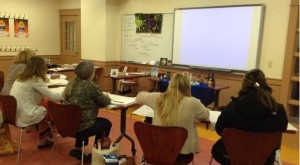Aristotle once said, “The greatest thing by far is to have command of metaphor … it is a mark of genius.”
Those who value the arts know that images, whether real or imagined, are usually much more powerful than words. Now this ancient wisdom is being confirmed by science as new understanding emerges about the pivotal role that metaphors play in effective teaching – and learning — through the visual imagery and comparisons they create for the mind.

ABC-World Citizens board member and art educator Inger Gregory recently presented the workshop, “Metaphors, Powerful Tools for Teaching,” at the annual New Hampshire Art Educators Association conference. This year’s conference, held in October at the New Hampshire Institute of Art in Manchester, NH, emphasized the integration of the arts into all aspects of students’ learning.
The workshop explored the role of metaphor in encouraging creative thinking, and shared exciting new research from the Massachusetts Institute of Technology (MIT). Through a variety of activities, participants, who included both art educators and students currently enrolled at the Art Institute, focused on how integrating metaphor in teaching helps students link new understanding with existing learning and knowledge, and what the wider benefits of that can be.
“Through the opportunity that they provide for us to compare and contrast things that may, at first, appear unrelated, metaphors help build bridges of understanding by giving us a way to consider and use different, complimentary views during the process of problem-solving,” says Inger.
“What brain-science research is also showing now is that metaphors can help us reframe what is already familiar to us, and then create broader and long-lasting impressions, because it’s been demonstrated that they actually assist in the transfer of content from short-term to long-term memory.”
As art and science continue to assist and inform each other in ways like these, we are discovering the pathways that can enable us to solve problems and enhance development on a global scale, too.